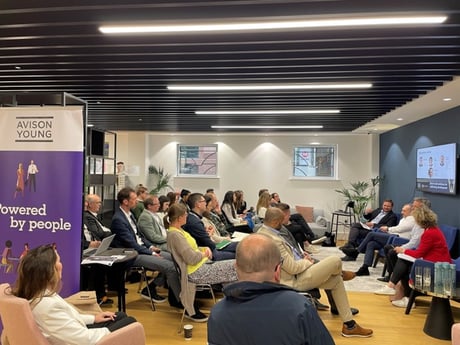Navigating the opportunities and challenges of strategic placemaking at UKREiiF

At this year’s UKREiiF, we partnered with Trowers & Hamlins to deliver a dynamic Masterclass series. Filled with deep insights and discussions, each of the interactive sessions equipped professionals with practical strategies to tackle the array of pertinent challenges we’re witnessing across the real estate landscape, including public sector procurement, navigating changes in planning systems, and negotiating joint ventures.
Across each of the workshops, attendees and panellists came together, sharing thoughts, experience and insights to help the sector make positive steps towards strategic, considered placemaking. Reflecting on the success, in this piece we’ll be exploring the key takeaways from each of the sessions.
Innovation in funding, delivery and procurement
Aimed at regeneration professionals, the session brought together investors, developers and public sector professionals to explore new procurement regulations and innovative approaches to funding. James Dair, Principal at Avison Young chaired the session which saw Katie Saunders of Trowers & Hamlins, Stephen Kinsella of Barratt Developments and Phill Mayall of Muse provide practical solutions for addressing financial and commercial partnerships.
The value of trust and confidence in partnerships can never be overstated when discussing private-public sector relationships, and this was a reoccurring theme throughout the conversation as the group discussed its pivotal role in delivering successful regeneration. The group agreed on the importance of early engagement, with acknowledgement to improved facilitation under the Procurement Act, exploring how this helps the public sector establish a procurement process that attracts the best bidder to maximise opportunity. Also covered during the session was the use of funding structures to kick-start projects in an era of significant cost inflation and plateaued value.
Mastering funding applications
In the increasingly competitive funding arena, ensuring your scheme is ready for investment is vital. In the workshop, chair Nicola Rigby, drew on Avison Young’s experience supporting both public and private sector clients to guide the conversation around the key actions needed to secure funding. Key considerations that came out of the discussion included: simple dialogue and demonstrating long-term commitment are key to offering reassurance surrounding the recent complexities in the funding process, developers should be justifying need for funding under the context that it will be delivered from the public purse. However, while this increases the importance to highlight the schemes’ social impact, developers need to ensure they don’t overstate monetisation in order to keep expectations realistic.
Strategies for success in public/private sector collaboration
Successful placemaking schemes around the UK are testament to the union of the public and private sectors that explore the long-term economic and social needs in an area of interest. The workshop, which included contributions from Avison Young’s Barnaby Hillsdon, Gordon Isgrove and Mark McKelvey acknowledged that the two sectors are naturally driven by different factors ahead of entering a project, while highlighting that a team’s early efforts to find clear, deliverable common objectives will ultimately determine the scheme’s success.
Since both sectors have their own acronyms and complex terminology, the panel discussed the importance of establishing common language to avoid breakdown in communication and delays, while also exploring the ingredients of trust, understanding and will from both parties to foster a strong relationship that can drive governance.
S114: From the challenges to the utilisation of strategic assets reviews to rebalance and reset
Acknowledging the rise of Section 114s, the session discussed the industry need for knowledge of S114 processes and consequences in order to define objectives and identify opportunities. With the aim to inform and inspire strategic decision making, a panel featuring Avison Young’s James Dair, Dan Butler and Trowers & Hamlins’ Amardeep Gill, highlighted the importance of securing legal, financial and real estate advice, ensuring thought-out governance to reach the right decisions. Due to the intricacies of strategic asset reviews, the group agreed on the importance for the sector be realistic and pragmatic surrounding the development of council assets, ensuring that it’s viewed with a long-term approach.
Challenges and opportunities in retrofitting to improve sustainability
As developers look towards sustainability targets, this workshop explored the challenges and opportunities that surround retrofitting schemes. With rising pressure from legislation regarding ESG reporting and letting substandard property, Avison Young’s Virginia Blackman and Lesley Males, and Chris Paul of Trowers & Hamlins made up the panel which explored retrofitting as a solution. For this to be a viable route, the group addressed the industry need to broaden its focus beyond operational carbon to include embodied carbon – with the inclusion of circularity and recycling methods to further improve a scheme’s environmental impact. The panel also discussed the funding gap, mentioning the need for landlords and owners to look to third party finance opportunities to top up the difference from received grant funding.
Estate regeneration: keys to successful outcomes
With knowledge of the pivotal role the public sector plays in shaping the built environment, this workshop was targeted towards local authorities to help them shape and de-risk projects and ensure a successful scheme. Avison Young’s Craig Alsbury and Virginia Blackman sat alongside Chris Plumey and Tim Brown of Trowers & Hamlins to offer insight from years of experience working with both the public and private sector. The group explored an array of topics, including the importance of early and consistent community engagement, identifying clear, realistic and flexible goals and doing the preparation to attract the right partner to deliver the scheme.
It was great to bring together both sectors to develop further insight and opinion around the pivotal conversations emerging from the landscape, in the effort to make positive steps towards collaborative and long-term placemaking.
If you're interested in learning more about any of the topics discussed or if you’d like to stay up to date with our future masterclasses, contact:

